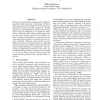Free Online Productivity Tools
i2Speak
i2Symbol
i2OCR
iTex2Img
iWeb2Print
iWeb2Shot
i2Type
iPdf2Split
iPdf2Merge
i2Bopomofo
i2Arabic
i2Style
i2Image
i2PDF
iLatex2Rtf
Sci2ools
110
click to vote
COLING
2000
2000
Estimation of Stochastic Attribute-Value Grammars using an Informative Sample
We argue that some of the computational complexity associated with estimation of stochastic attributevalue grammars can be reduced by training upon an informative subset of the full training set. Results using the parsed Wall Street Journal corpus show that in some circumstances, it is possible to obtain better estimation results using an informative sample than when training upon all the available material. Further experimentation demonstrates that with unlexicalised models, a Gaussian prior can reduce overfitting. However, when models are lexiealised and contain overlapping features, overfitting does not seem to be a problem, and a Gmlssian prior makes minimal difference to performance. Our approach is applicable for situal;ions when there are an infeasibly large mnnber of parses in the training set, or else for when recovery of these parses fl'om a packed representation is itself comi)utationally expensive.
COLING 2000 | COLING 2008 | Parsed Wall Street | Stochastic Attributevalue Grammars | Training Set |
Related Content
| Added | 01 Nov 2010 |
| Updated | 01 Nov 2010 |
| Type | Conference |
| Year | 2000 |
| Where | COLING |
| Authors | Miles Osborne |
Comments (0)

